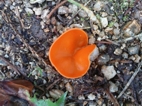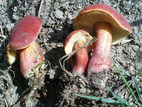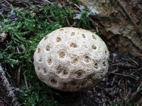Difference between revisions of "IBF Fungi"
| Line 1: | Line 1: | ||
| − | The actual diversity of fungi, i.e., mainly macrofungi, in three natural areas around Regensburg will be monitored during 50 surveys within two years. The areas are a) the Otterbach valley near Altenthann; b) the nature reserve "Sippenauer Moor", a calcareous and sulphuric fen near Saal a.d. Donau; c) the calcareous dry grasslands of the "Alpiner Steig" between Eilsbrunn and Schönhofen. They belong to three of the | + | The actual diversity of fungi, i.e., mainly macrofungi, in three natural areas around Regensburg will be monitored during 50 surveys within two years. The areas are a) the Otterbach valley near Altenthann; b) the nature reserve "Sippenauer Moor", a calcareous and sulphuric fen near Saal a.d. Donau; c) the calcareous dry grasslands of the "Alpiner Steig" between Eilsbrunn and Schönhofen. They belong to three of the [http://www.bayernflora.de/de/export/FlorenregionenK.jpg eight floristic regions] in Bavaria. Detailed information on the occurrence of vascular plants, bryophytes, lichens and fungi are already available for these areas due to long-time floristic investigations there. The actually gathered data will be campared with those historical data. They will give hints for changes in species diversity, and provide more information about exact localisations and abundance of the organisms observed. Furthermore, the data will be analysed according to ecological factors derived from [http://www.pilzoek.de/ PILZOEK]. |
Major scientific goal of these investigations is to generate ecological profiles for the observed taxa based on the vegetation units, habitats and substrate types on which they occur. The monitoring of fungi is conducted in parallel to the lichen monitoring ([[IBF Lichens]]) in the same habitats. | Major scientific goal of these investigations is to generate ecological profiles for the observed taxa based on the vegetation units, habitats and substrate types on which they occur. The monitoring of fungi is conducted in parallel to the lichen monitoring ([[IBF Lichens]]) in the same habitats. | ||
Revision as of 09:18, 12 November 2009
The actual diversity of fungi, i.e., mainly macrofungi, in three natural areas around Regensburg will be monitored during 50 surveys within two years. The areas are a) the Otterbach valley near Altenthann; b) the nature reserve "Sippenauer Moor", a calcareous and sulphuric fen near Saal a.d. Donau; c) the calcareous dry grasslands of the "Alpiner Steig" between Eilsbrunn and Schönhofen. They belong to three of the eight floristic regions in Bavaria. Detailed information on the occurrence of vascular plants, bryophytes, lichens and fungi are already available for these areas due to long-time floristic investigations there. The actually gathered data will be campared with those historical data. They will give hints for changes in species diversity, and provide more information about exact localisations and abundance of the organisms observed. Furthermore, the data will be analysed according to ecological factors derived from PILZOEK. Major scientific goal of these investigations is to generate ecological profiles for the observed taxa based on the vegetation units, habitats and substrate types on which they occur. The monitoring of fungi is conducted in parallel to the lichen monitoring (IBF Lichens) in the same habitats.
Scientists in this workpackage: Prof. Dr. A. Bresinsky, J. Simmel


